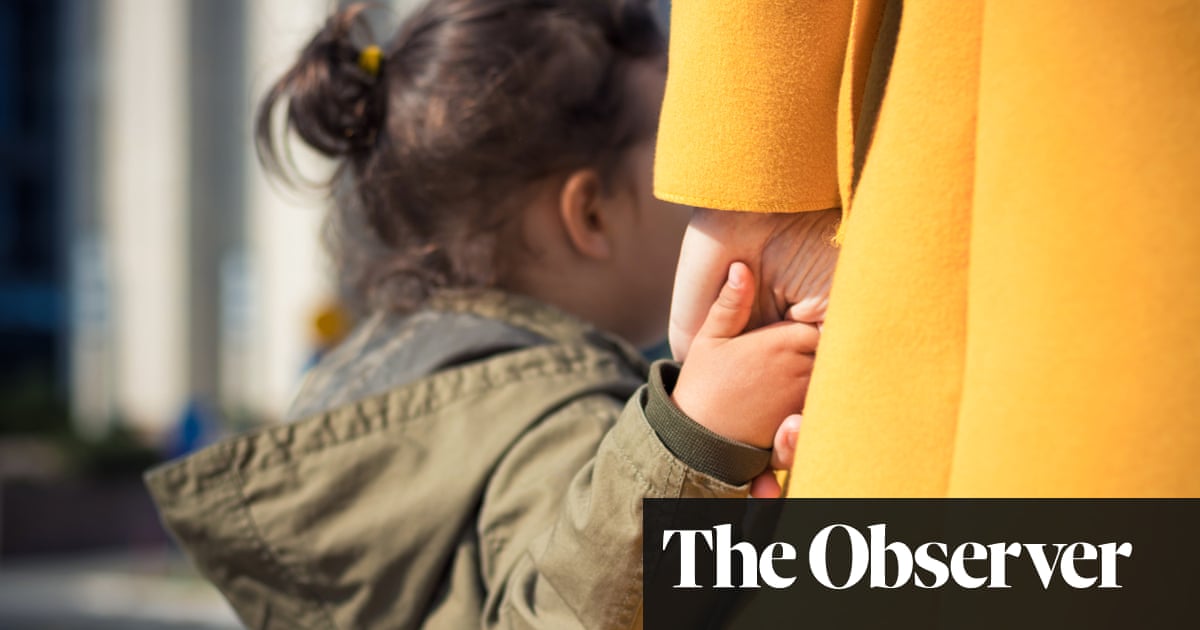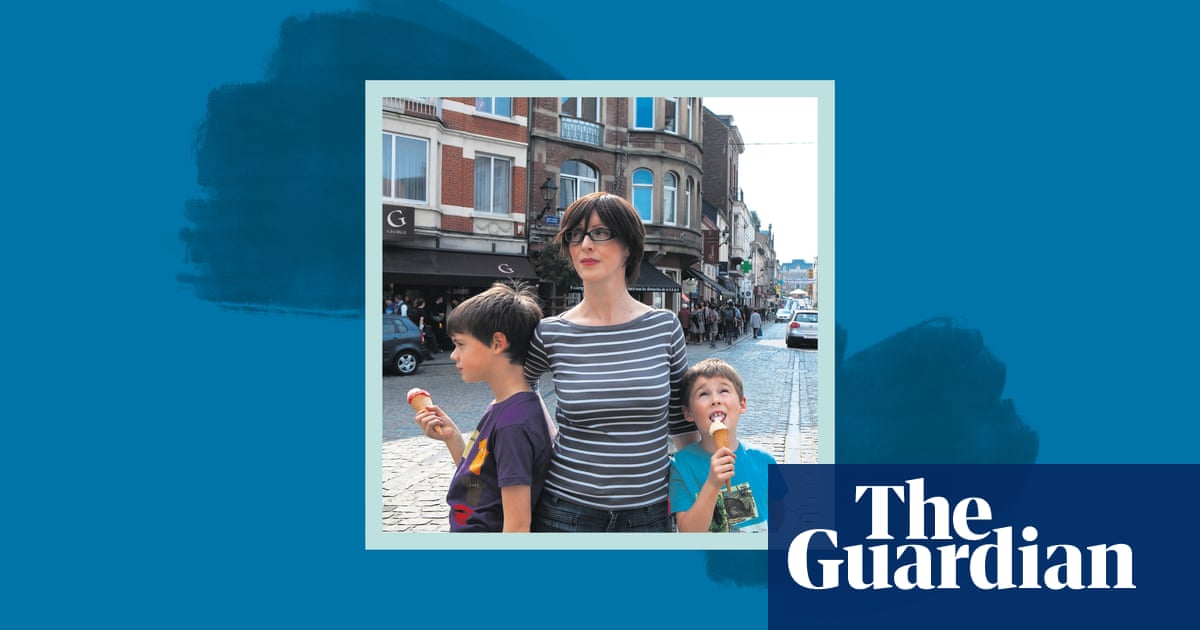
Born in Oldham in 1966, Shobna Gulati began her career as a dancer and choreographer, before landing breakthrough TV roles as the lovable idiot Anita in Dinnerladies and Sunita Alahan in Coronation Street. As well as a 35-year career in acting, she published Remember Me? in 2019, a memoir chronicling her experience of caring for her late mother, who had dementia. Having recently starred in Everybody’s Talking About Jamie, Shobna is currently touring alongside her 27-year-old son, Akshay, in the play The Rise and Fall of Little Voice.
Shobna
This photograph was taken at my sister’s house. I can tell because we’re sitting on one of her fancy chairs. I had just started in Dinnerladies, and we’d come down from Manchester to London for a wedding, which is why we’re in our special outfits. Akshay is holding a guitar given to him by my mum. He has always been very fond of music and learned the euphonium at school, but big brass instruments aren’t very sexy, so he gave it up. He gave up the guitar, too. Actually, he could be playing it again, but I wouldn’t know. He’s busy doing his own thing; he wouldn’t tell me!
I’m working with Akshay at the moment, and what’s beautiful is that we’re in a space where we are equals. I’m not his mum and he’s not my son – we are actors in a room. There’s a hierarchy in place, and it’s the director who has the keys. It’s an extraordinary feeling to relinquish that normal mother-son dynamic. Especially testing as a single mum.
My journey as a parent has been full of challenges. The papers always used to describe me as “falling pregnant”, which I found hilarious. I didn’t trip and land on someone’s willy. I became pregnant. It wasn’t society’s “normal” pregnancy narrative, so it was spoken about in loaded terms. I always thought I’d go to university and meet someone, get married and have babies, like my sisters and brothers. But it wasn’t that way for me.
I was 28 and dancing at the time. Working on a show called Moti Roti, Puttli Chunni, a play at the Theatre Royal, Stratford East in London. It was my first proper theatre job and it was getting great reviews. When we were touring, I grew and grew with Akshay inside me, and confronted all the challenges that being pregnant brings. It was out of wedlock and with a man who my family and wider community didn’t consider part of our culture. I had to hide my bump when I came to Manchester, and all the aunties would say: “You’ve put on weight!” The next time I turned up, I was with a baby and one of them asked: “Whose baby is this?” I said: “It’s mine, aunty.” I was shamed and faced a huge backlash, but I’m not afraid of standing up for my choices and who I am.
Regardless of how the rest of the community reacted to my baby, my mum supported me. I try very hard to emulate that approach with Akshay. Whatever you need, I’m here. Nothing he can do could shock me. Mum stood up to her own children and community; stood up for me and helped me raise Akshay when I was on my own. What I’ve learned – from that experience and with caring for mum before she died – was that in the end it is all about love. There is nothing beyond that.
Sometimes Akshay and I have arguments. Discussions we call them. We do conflict resolution exercises, which have been very helpful when we reach peaks. We’ve got to be able to speak our minds. The shit can stink if you don’t flush it away and start again.
We both really like to eat and to watch football. I’m a Manchester United fan, and there was a point when he was little and wanted to support a different team. When he told me that, I replied: “I will disown you.” All that understanding – throw it out of the window! But as he progresses into adulthood, I have to get rid of the reins. Understand he’s becoming an adult, too, with his own life. That’s been hard for me, but I’m getting there.
Akshay
I’ve got this photo up in my bedroom, and even though I don’t remember it being taken, it’s always been an important image. Me and Ma against the world. We’ve always had that mentality – along with my grandma, who had a pretty big role in bringing me up.
In our household there were no men. It was either Mam or Nani and my cousins, who were three girls. Five very strong women. This saying gets bandied about that lads need a “strong male role model”, but I like to think I turned out OK having exclusively strong females bringing me up.
I was known at school for having a famous mum, which meant more scrutiny on top of being black and Punjabi, in a very white school in Oldham. With an afro. It was never a case of, “Your mum is a successful actor on the telly.” It was more, “Oh, I saw your mum in a magazine, she was wearing this.” But the older I got, the more I appreciated what she had achieved. To consistently work as a woman of south Asian heritage in a very male- and white-dominated space is dead cool.
Ma always encouraged me to speak my mind. But there was a lot I didn’t share with her because I didn’t want to burden her with any more than she already had going on. She was really good at advice, though. If someone was being mean at school, she’d say something like: “Fuck it!” She also instilled in me an attitude of, if you haven’t got anything nice to say to someone, don’t say anything. For example: don’t ever tell anyone they look tired. Especially a woman. They can’t do anything about it and it’s just mean. She’s full of fantastic titbits like that.
Ma has always described herself as awkward, whereas I am quite sure of myself. I think that’s a lot to do with how she brought me up. If I was upset about anything, by the end of a conversation she’d make me feel proud of my south Asian heritage and who I am. My mum celebrates differences and that’s the way I’m trying to live my life. With no apologies.












